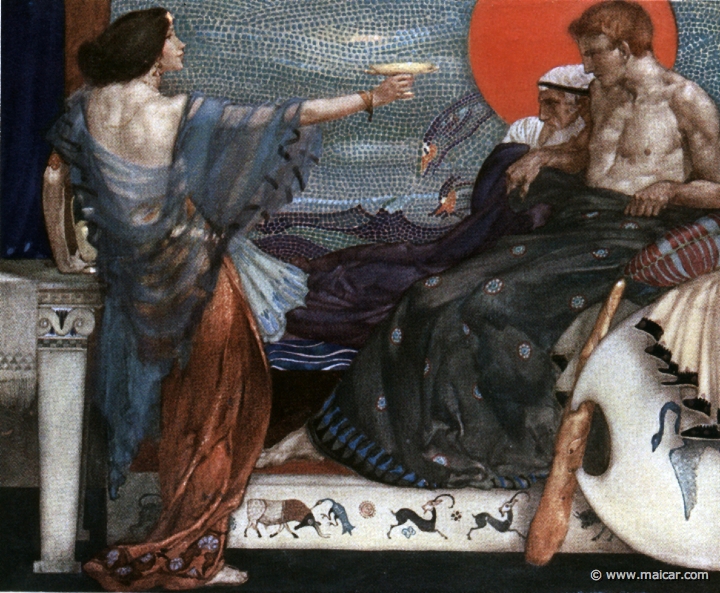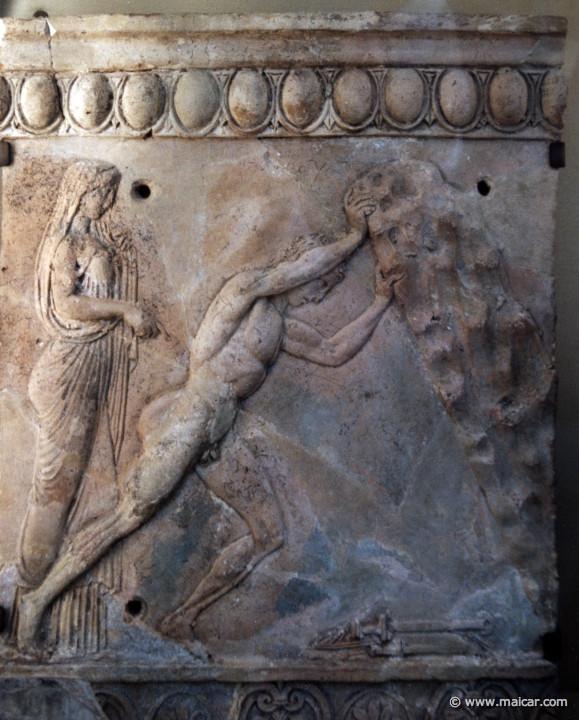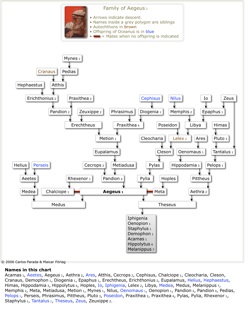 |
|
|

|
Medea, offering the poisoned cup to Theseus, who sits beside his father, King Aegeus. Painting by William Russell Flint (1880-1969). Charles Kingsley, Grekiska Hjältesagor (1924, Swedish Edition of The Heroes). Paintings (watercolors) from 1911.
|
|
Aegeus 1, after whom the Aegean Sea is called, became king of Athens, but, having difficulties to make a little prince who could inherit his throne, he married several women, including a criminal sorceress.
Birth
Aegeus 1 was born in Megara (the city on the Isthmus of Corinth), where his father, the Athenian Pandion 4, had settled after being expelled from Athens by the sons of Metion 1. Yet, some have said that Aegeus 1 was not the son of Pandion 4, but of Scyrius, possibly a Megarian, and that Pandion 4 adopted him as his own child.
Brothers divide kingdom
In any case, when Pandion 4, who was king of Megara, died, Aegeus 1 and his brothers—Pallas 5, Nisus 1 and Lycus 7—successfully attacked Athens, expelling the sons of Metion 1 and dividing the power among themselves. It has been said that Megara was at the time a part of Attica, and that Nisus 1 received his part when he became king of that city. Lycus 7 became king of Euboea whereas Pallas 5 received the southern part of the territory. Aegeus 1, being the eldest of the brothers, received what they all regarded as the best part: Athens.
Aegeus 1 takes all
Power being difficult to share, Aegeus 1 thought it appropriate to take the whole of it for himself. Nisus 1 ruled in Megara until King Minos 2 of Crete, aided by Nisus 1's own daughter, overthrew him. But Lycus 7 was driven from the territory by Aegeus 1 himself, and had to seek refuge in Arene (Messenia). Pallas 5 and his fifty sons revolted at a later time, being crushed by Aegeus 1's son Theseus.
No children
Aegeus 1 married Meta, but since no children came from this marriage, he, hoping to correct that deficiency, took a new wife Chalciope 1. When for a second time no children were born, Aegeus 1 traveled to Delphi to consult the oracle concerning the begetting of children. For he feared that his brothers and nephews could take advantage of that unfortunate circumstance, and overthrow him. Aegeus 1 is believed to have established in Athens the cult of Aphrodite Urania, whose wrath made him childless (Pau.1.14.7). The Delphic Oracle then answered:
"The bulging mouth of the wineskin, O best of men,
Loose not until thou hast reached the height of Athens." (Apollodorus, The Library 3.15.6).
Now, not few, if they heard such words, would abstain from drinking, even if they could not fully understand the oracle. But Aegeus 1, either because he had a confused mind or for another reason, made a détour on his way back to Athens, and journeyed by way of Troezen, where King Pittheus, who understood the oracle perfectly, made him drunk and caused him to lie with his daughter Aethra 2. Having realised what he had done, Aegeus 1 told Aethra 2 that, if she gave birth to a male child, she should rear it, without telling who his father was. Then he left a sword and sandals under a heavy rock, instructing her to send the boy to Athens when he would be strong enough to roll away the rock and take both sword and sandals up.
A child
Aegeus 1 then left for Athens, and in time a boy, Theseus, was born to Aethra 2, who later, when Theseus was sixteen years old, did exactly as Aegeus 1 had instructed her. However, though some call Theseus son of Aegeus 1, nothing is sure in this respect. For it is also said that, on the same night, Poseidon consorted with Aethra 2, and that Theseus is the son of the god. On his return, Aegeus 1 is said to have established in Athens the cult of Aphrodite Urania, thinking that he was childless because of the wrath of the Heavenly Aphrodite. He also celebrated the Panathenian games, which were won by Androgeus, son of King Minos 2 of Crete. Some assert that, after the festival, Aegeus 1 sent Androgeus against the Marathonian Bull, and that the young man was destroyed by the beast. Others affirm, that Androgeus was killed by jealous competitors after winning the games.
War with Crete
In any case, Androgeus' death is said to have been the cause of the war between between Minos 2 and the Athenians, although it is also affirmed that Androgeus was killed, not before but during that war. King Minos 2 had at the time a powerful fleet at his disposal. Being master of the sea, he attacked not only Athens but also Megara, which was then ruled by Aegeus 1's brother Nisus 1. Minos 2 captured Megara, but he could not take Athens, which instead was visited by famine and pestilence. As the Athenians, being blockaded, were suffering heavy losses, they inquired of the oracle how they could be delivered, and the oracle answered that they should give Minos 2 whatever satisfaction he might choose. Having then offered peace, Minos 2 ordered them to send seven youths and as many maids every year to Crete to be fodder for the Minotaur, and when the Athenians accepted these conditions, the war came to an end.
Medea's plight
|

|
Aethra 2 watches as Theseus lifts the rock. 8303: Theseus lifting the rock. Terracotta relief plaque. Roman 1st century BC or AD. British Museum, London.
|
|
In the meantime, the Colchian princess and witch Medea, having been betrayed by her husband Jason, committed terrible crimes in Corinth, being forced to leave the city. Fortunately for her, she could count on the hospitality of Aegeus 1, who, not only received her as an exile, but also wedded her. As they say, Aegeus 1 met Medea in Corinth, on his way back from Delphi, and there she asked him to receive her in his city, promising him to put an end to his childlessness.
Aegeus 1's oath
Aegeus 1, who swore by Gaia and by the holy light of Helius never to banish Medea from Athens received her in his kingdom and marry her. And after some time, Medea gave birth to a son Medus. But then again it is not sure that Medus was Aegeus 1's son; for some have said that he was the son of Jason.
Aegeus 1 breaks his oath
Aegeus 1 did not keep his promise to Medea. According to some, she was banished from Athens because the priestess of Artemis told the king that she could not perform sacrifices in the proper way because there was a woman in the city who was a sorceress and a criminal. But others have said that Medea was still in Athens when Theseus, after having cleared the road between Troezen and Athens, came to the city, carrying his father's sword.
Medea's plot
Medea, who had royal plans for her son Medus, started plotting against the newcomer Theseus as soon as he arrived, persuading the king to beware of him as a traitor. Aegeus 1 then planned to end Theseus' days by the same method he had used against Androgeus, that is, by sending him against the Marathonian Bull. But as Theseus destroyed the beast, Aegeus 1 presented to him a poison that had been prepared by Medea, who by now had a long experience in plots and murders.
Aegeus 1 recognises Theseus
It was just before drinking the poison, they say, that Theseus, when the meats were served, drew the sword that had been hidden under the rock in Troezen. And when Aegeus 1 recognised it, he dashed the cup from his hands. This is how father and son reunited; and this was also the end of Medea's sojourn in Hellas. For being hated in several cities, from Thessaly to the Isthmus of Corinth, she returned to Colchis where she continued her bloody carrier, murdering her uncle.
Death of Aegeus 1
The arrival of Theseus strengthened the city and secured the throne, for his expedition to Crete liberated Athens from its subjection to the power of Minos 2. But on his return, Theseus forgot to spread white sails on his ship when he stood for port; and Aegeus 1, seeing the black sail from the Acropolis, believed that Theseus had perished in Crete, and threw himself into the sea (called Aegean after him), and died. For they say that the ship that carried the youths to Crete used to make the voyage with black sails, but that Theseus, who expected to destroy the Minotaur, had told his father that he would use white sails if he should return victorious. However, the loss of Ariadne made him forget the signal, and when Aegeus 1 saw from the distance the ship borne by black sails, he thought that Theseus was dead and killed himself. Some have said that the sail which would signal victory was not white but "a scarlet sail dyed with the tender flower of luxuriant holm-oak". In any case, the signal was forgotten, and Aegeus 1 threw himself down, and if he did not fall into the sea, he was dashed in pieces against the rocks.
Theseus secures the throne
Theseus then, either son of Poseidon or of Aegeus 1, succeeded to the throne and immediately put an end to the royal hopes of his cousins, the sons of Pallas 5, brother of Aegeus 1, by killing them all.
-
Others with identical name
- Aegeus 2 was the son of Oeolycus, son of Theras, a descendant of Cadmus. Aegeus 3 was the son of Phorbas 2, the man who killed many snakes in the island of Rhodes.
|
| Family |
|
|
|
|
|
|
|
|
|
Pandion 4 reigned in Athens after his father Cecrops 2, but was expelled by the sons of Metion 1 and emigrated to Megara, being later appointed king of the city. Pylia is daughter of Pylas, the Megarian king who founded the city of Pylos, leaving Megara to Pandion 4.
Scyrius is otherwise unknown.
|
|
|
|
Aegeus 1's first wife Meta was daughter of Hoples, otherwise unknown.
|
|
|
|
Chalciope 1 was Aegeus 1's second wife. She was daughter of Rhexenor 1, otherwise unknown.
|
|
|
|
Aethra 2 is daughter of King Pittheus of Troezen, son of Pelops 1. She consorted on the same night with both Aegeus 1 and Poseidon, and that is why nobody knows for certain who is Theseus' father. When her son was sixteen years old, she let him get the tokens that Aegeus 1 had left at Troezen under a rock, sword and sandals, and following Aegeus 1's instructions, she sent him to Athens.
Later in life, Theseus carried off Helen and brought her to Aphidnae. But Helen's brothers the DIOSCURI marched against the city during Theseus' absence, and having got possession of Helen, led Aethra 2 away captive. She became the handmaid of Helen, and when the latter, seduced by Paris, moved to Troy, Aethra 2 followed her as a maid and slave. At the end of the Trojan War, however, Agamemnon bestowed freedom on her, and she was taken back to Athens by Demophon 1 and Acamas 1, her grandsons.
Some have said that Aethra 2 committed suicide.
|
|
|
Clymene 6 became Helen's maid at Troy, along with her mother.
|
|
|
|
Medus conquered barbarians after having come to Colchis with his mother, and called his kingdom Media after himself.
|
|
|
|
|
|

|
Genealogical Charts
Names in this chart: Acamas 1, Aeetes, Aegeus 1, Aethra 2, Ares, Atthis, Cecrops 2, Cephisus, Chalciope 1, Cleocharia, Cleson, Cranaus, Demophon 1, Diogenia 1, Epaphus 1, Erechtheus, Erichthonius 2, Eupalamus, Helius, Hephaestus, Himas, Hippodamia 3, Hippolytus 4, Hoples, Io, Iphigenia, Lelex 2, Libya, Medea, Medus, Melanippus 7, Memphis 2, Meta, Metiadusa, Metion 1, Mynes 1, Nilus, Oenomaus 1, Oenopion 1, Pandion 2, Pandion 4, Pedias, Pelops 1, Perseis, Phrasimus, Pittheus, Pluto 3, Poseidon, Praxithea 2, Praxithea 4, Pylas, Pylia, Rhexenor 1, Staphylus 1, Tantalus 1, Theseus, Zeus, Zeuxippe 2.
|
|
|
| Related sections |
Athens, Medea, Theseus, Troezen |
|
|
Sources
Abbreviations |
Apd.1.7.2, 1.9.28, 3.15.5-7; Apd.Ep.1.5, 1.11; Dictys 6.2; Dio.4.61.6; Eur.Med.1386 and passim; Eur.Supp.6; Hdt.1.173; Hyg.Fab.26, 43; Pau.1.5.4, 1.27.8; Plu.The.12.2, 22.1; Strab.1.6.
|
|
|